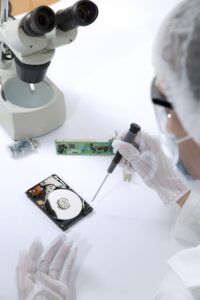Riverside Data Recovery

From Collection to Protection: The Vital Need for Data Recovery
Unfortunately for those with critical data to protect, there is simply no shortage of reasons why data recovery may be required.
From confidential client data to wedding photos or Little League videos, the ease-of-use in record-keeping ensured by an increasingly digital world means that pains must be taken to protect what we collect.
Whether reasons behind data loss are related to hardware or software, the result is the same: When there is vital data in need of rescue, it’s best to call a professional.
So, What Happened?
The term “physical damage” covers all sorts of mishaps. Whether a hard-drive was dropped onto a concrete floor or into a bucket of water, damage caused to the actual physical element of your data-storage unit could be the culprit.
Of course, damage could also occur over the course of time — be it direct and obvious, or accrued and unseen. Unsuccessful and unprofessional repairs, intentional or unintentional tampering, and any number of other purely accidental or deliberate damages can severely hamper a well-functioning hard drive.
In most cases, the data typically remains on the hard drive, but is challenging to access due to trauma to the hardware. Oftentimes, data recovery of this nature requires specialized tools and well-honed technical experience.
Human error does account for a significant portion of data loss, whether it’s related to accidental deletion of files, or the spilling of a soft drink onto the hard drive.
A hard drive can fail if it’s not properly protected during a power surge, or if its chips are essentially fried, or burned out. It can also fail if the head crashes, or if it has corrupted or absent folders or files, “Master File Table,” or “file allocation table.” In addition to a host of other reasons, a hard drive that has been improperly formatted can also lead to data loss.
Because the manufacturers of hard drives typically don’t release proprietary details about their products to the general public, it’s often difficult for users to know how to repair faulty hard drives themselves. When a hard drive fails, calling on a professional data recovery specialist will typically yield the best results.
When Software is the Culprit
In plenty of other instances, software is the primary data-loss culprit. None of us are strangers to harmful viruses in the form of malware or other dangerous programs that cause serious data loss, which is why anti-virus protection is a popular choice.
Additional software-related causes for data loss include the deletion of data, either accidentally or maliciously, as well as errors in software, and the accidental formatting or loss of partitions.
Damage to hard drives can occur instantly or over time and by damage to hardware, software, or a combination of the two. Consulting a knowledgeable source can help in detecting what went wrong and, if it was a matter of human error, making certain that the error is never repeated.
Taking appropriate steps to protect our hardware and software can prevent data-loss emergencies before they occur, underlining the age-old adage that an ounce of prevention is worth a pound of cure.